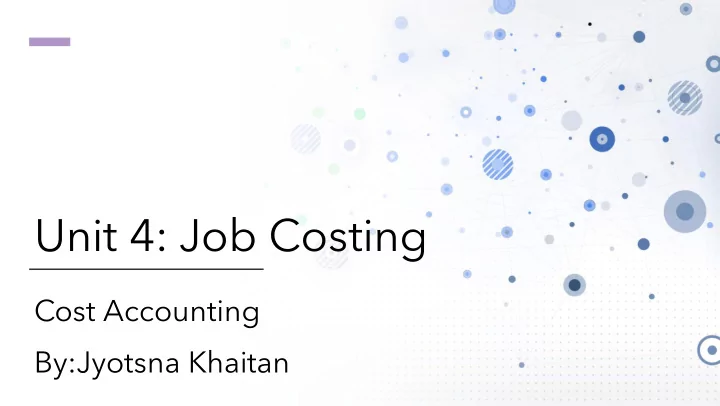

Unit 4: Job Costing Cost Accounting By:Jyotsna Khaitan
There are two types of manufacturing concerns; 1) Mass production concerns: They produce uniform standard products involving the same type of raw-materials and labour and pass through the same set of processes. For eg.; paper manufacting, flour mills, etc. 2) Special order concerns: They manufacture products in distinguishable lots in accordance with special orders and individual specifications. For eg.; Printing shops, wood working shops, etc.
In case of special-order concerns, products-produced or jobs- undertaken may be of diverse nature. Different products and jobs may involve materials and labour of different quantities and different amounts of overhead costs. In such cases separate job-card or cost-sheet is maintained for each product or job, in which all expenses of materials, labour, overheads are entered and cost of manufacturing a product or completing a job is calculated. Such a cost system is known as Specific Costing or Job Costing.
ILLUSTRATION : Following information has been extracted from costing records of ABC Engineering Works in respect of Job No. 12: Materials: Rs. 3,450 Wages : Department A 60 hrs @ Rs. 3 per hour Department B 40 hrs @ Rs. 2 per hour Department C 20 hrs @ Rs. 4 per hour Overheads for three departments are estimated as follows: Variable Overheads: Department A Rs. 4,000 for 4,000 direct labour hours Department B Rs. 3,000 for 1,500 direct labour hours Department C Rs. 1,000 for 500 direct labour hour Fixed Overheads: Estimated at Rs. 10,000 for 10,000 normal working hours. You are required to calculate the cost of Job No. 12 and calculate the price to be charged so as to give a profit of 20% on the selling price.
Solution: Cost Sheet Job No. 12 Particulars Amount Amount (Rs. ) (Rs. ) Direct Materials 3,450 Wages: Department A – 60 hrs @ rs. 3/hr 180 Department B – 40 hrs @ rs. 2/hr 80 Department C – 20 hrs @ rs. 4/hr 80 340 PRIME COST 3,790
Particulars Amt (Rs) Amt (Rs.) Direct Materials 3,450 Wages: Department A – 60 hrs @ rs. 3/hr 180 Department B – 40 hrs @ rs. 2/hr 80 Department C – 20 hrs @ rs. 4/hr 80 340 PRIME COST 3,790 Variable Overheads: Department A – 60 hrs @ re. 1/hr 60 (rate = amt of overheads÷no. of labour hrs = rs. 4,000 ÷ 4,000 labour hrs) Department B – 40 hrs @ re. 2/hr (rate = rs. 3,000 ÷ 1,500 labour hrs) 80 Department C – 20 hrs @ re. 2/hr (rate = rs. 1,000 ÷ 500 labour hrs) 40 180 Fixed Overheads: 120 hrs @ Re. 1 per hr (fixed overhead rate = amt of estimated fixed overheads ÷ Normal 120 working hrs = 10,000 ÷ 10,000) TOTAL COST 4,090 PROFIT 20% on selling price or 25% on cost 1,022.5 SELLING PRICE 5,112.5
Working notes: Profit = 20% of Selling price Total Cost + Profit = Selling Price Therefore, Total cost + 20% of selling price = selling price Or total cost = selling price – 20% of selling price Or total cost = 80% of selling price Or 4,090 = 80% of selling price SELLING PRICE = (100×4,090)/80 = 5,112.5 PROFIT = 20% of 5,112.5 = 1,022.5
Recommend
More recommend